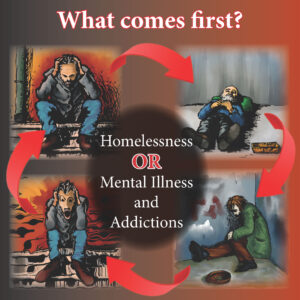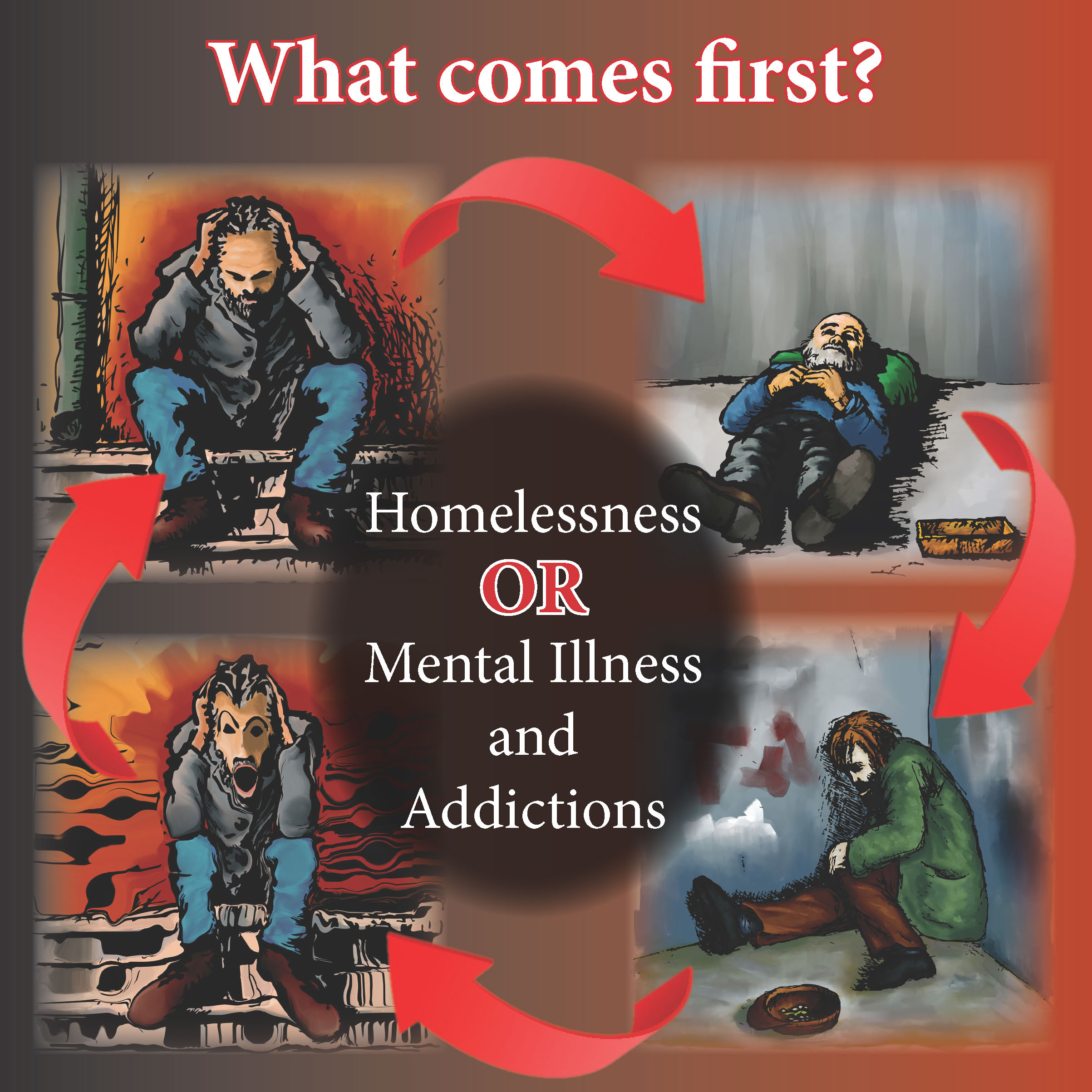By Jeremy Reynalds, Ph.D.
Founder and CEO
Joy Junction Inc.
 Which comes first? Does mental illness lead to homelessness, or do the stresses and struggles which accompany homelessness possibly trigger mental illness?
Which comes first? Does mental illness lead to homelessness, or do the stresses and struggles which accompany homelessness possibly trigger mental illness?
Then right alongside that question. Does alcoholism result in homelessness, or the misery of everyday living experienced by many homeless people lead to alcoholism?
Writing on our Facebook page, someone commented that until recently they would have said it is mental illness that results in people becoming less functional and unable to maintain themselves.
However, that person continued, “Statistically speaking how many psychologically ‘normal’ people hit the street due to job loss, loss of income, etc., then developed anxiety disorder … depression, and even psychotic breaks due to the hopelessness of that amount of poverty.”
It’s a good point, and one which drew a lot of commentary on Facebook.
Angela said it’s a chicken or egg scenario. You know, which came first?
She said becoming homeless would cause many so called “sane” people to become depressed. She added, “Not being able to provide for yourself or children would cause depression … (and) I am … not sure that one is greater than the other or that there is a right answer.”
However, Angela said, there definitely need to be more attention for this “epidemic.”
Mary said she doesn’t think there’s a “right” answer.
She continued, “Mental illness will inevitably cause a person to become homeless without any love or support. A healthy person will inevitably have their breaking point, and have a mental breakdown being homeless without love and support. So the more support we can give, the more we can educate ourselves, the more we can find a solution to homelessness.”
Celia said for her, addiction brought on mental health issues.
“I became depressed, anxious, hopeless, isolated and then homeless because I had used up my family and friends and their patience. Next step was homelessness, which in itself caused more of the mental (health issues).”
She added, “I’ve found other avenues to reduce stress and anxiety without resorting to slip and go back to my addiction. That’s always there, so once again I’m back to the stress and anxiety and still homeless.”
Stephenie said there’s no clear answer as to which comes first, as the situation can go both ways.
She said that mental illness can come first and cause someone’s life to spiral out of control, “especially if they don’t seek help or don’t recognize the warning signs of mental illnesses.”
As a result, she said, people end up losing their job, home, car, and push themselves away from friends and family.
She added, “Then they eventually become homeless and on the streets. Many people with mental illness will also self medicate with drugs and alcohol, and that can lead to homelessness.”
Conversely, Stephenie continued, the stress of losing your job, livelihood and car can trigger depression and anxiety and result in homelessness.
Joanna said that when you feel hopeless, and the feeling of normal “isn’t there” for you any more, depression and anxiety start to set in.
When that happens, you “start falling apart. The pain inside of you is horrific.”
She added, “We lose ourselves, and everyone that was in our lives will lose us also. Digging yourself out of that dark hole takes everything you have inside of you.”
Rachel said the question being addressed is known technically as “comorbidity.”
She added, “One can contribute to the other and it can go both ways. For statistics, there is a book called ‘Social Injustice and Public Health’ (2nd edition) by Barry Levy which addresses both homelessness and mental health. Two separate chapters but the homelessness chapter addresses mental health and the mental health chapter addresses homelessness.”
And what about substance abuse and homelessness? Which one causes the other? The same person who asked the question about mental illness commented, “I think if one was freezing cold, hungry, feeling suicidal/hopeless that ANYTHING available to relieve some of that pain would be welcomed.”
She proposed the scenario of someone sitting against a building, their feet hurting badly from walking around all day, and their back and joints hurting from arthritis or fibromyalgia.
She continued, “You felt that things could and would never get better, and you were sitting there grieving the loss of your children or pets due to your homeless situation and someone offered you a substance that you knew would make you care a bit less about it, wouldn’t it be tempting to alleviate the pain a little?”
Danielle said her ex husband has been through all of this, losing everything because of addiction that all started with a back injury.
She said, “He is clean now and taking his mental health meds, but still on the streets of NM sleeping in the cold.”
Adding another perspective, Destinie talked about “the ones that actively chose drugs/alcohol. Lost their jobs, homes, children, and still don’t try to get the help they need to get back on their feet. They’d rather beg and steal than get help and get sober.”
Paula responded, “When you are totally lost, faith is smothered in grief. Faith and hope are the only ways forward. What’s difficult is not standing in judgment … ”
So while I don’t have an answer to the question I posed at the beginning of this piece, here’s a good piece of advice. Whether someone is homeless because of mental illness, alcoholism or purely economic reasons, our place is to encourage and help-not judge.
Will you help us continue this almost 30 year old ministry of hope, help and encouragement?


